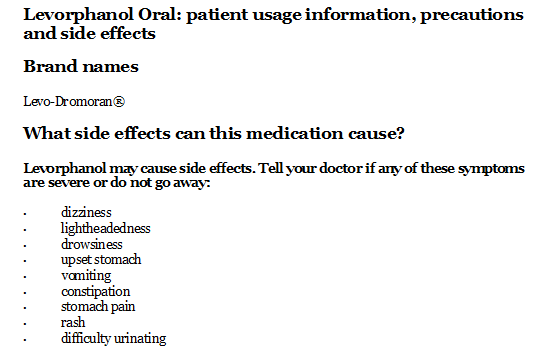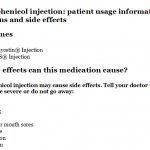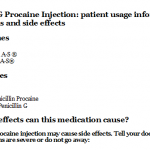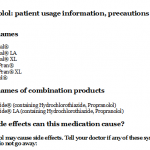
Levorphanol Oral: patient usage information, precautions and side effects
Tuesday, May 30, 2017 by Gregory Van Dyke
http://www.naturalnewsreference.com/2017-05-30-levorphanol-oral-patient-usage-information-precautions-and-side-effects.html

Levorphanol Oral: patient usage information, precautions and side effects
Brand names
Levo-Dromoran®
What side effects can this medication cause?
Levorphanol may cause side effects. Tell your doctor if any of these symptoms are severe or do not go away:
-
dizziness
-
lightheadedness
-
drowsiness
-
upset stomach
-
vomiting
-
constipation
-
stomach pain
-
rash
-
difficulty urinating
If you experience either of the following symptoms, call your doctor immediately:
-
difficulty breathing
-
fainting
If you experience a serious side effect, you or your doctor may send a report to the Food and Drug Administration’s (FDA) MedWatch Adverse Event Reporting program online (http://www.fda.gov/Safety/MedWatch) or by phone (1-800-332-1088).
Why is this medication prescribed?
Levorphanol is used to relieve moderate to severe pain.
This medication is sometimes prescribed for other uses; ask your doctor or pharmacist for more information.
How should this medicine be used?
Levorphanol comes as a tablet to take by mouth. It usually is taken every 4 hours as needed. Follow the directions on your prescription label carefully, and ask your doctor or pharmacist to explain any part you do not understand. Take levorphanol exactly as directed.
Levorphanol can be habit-forming. Do not take a larger dose, take it more often, or for a longer period than your doctor tells you to.
What special precautions should I follow?
Before taking levorphanol,
-
tell your doctor and pharmacist if you are allergic to codeine, levorphanol, or any other drugs.
-
tell your doctor and pharmacist what prescription and nonprescription medications you are taking, especially other pain relievers; antidepressants; medications for cough, cold, or allergies; sedatives; sleeping pills; tranquilizers; and vitamins.
-
tell your doctor if you have or have ever had liver or kidney disease, a history of alcoholism, lung or thyroid disease, heart disease, prostatic hypertrophy, or urinary problems.
-
tell your doctor if you are pregnant, plan to become pregnant, or are breast-feeding. If you become pregnant while taking levorphanol, call your doctor.
-
if you are having surgery, including dental surgery, tell the doctor or dentist that you are taking levorphanol.
-
you should know that this drug may make you drowsy. Do not drive a car or operate machinery until you know how this drug affects you.
-
remember that alcohol can add to the drowsiness caused by this drug.
What should I do if I forget a dose?
Levorphanol usually is taken as needed. If your doctor has told you to take levorphanol regularly, take the missed dose as soon as you remember it. However, if it is almost time for the next dose, skip the missed dose and continue your regular dosing schedule. Do not take a double dose to make up for a missed one.
What should I know about storage and disposal of this medication?
Keep this medication in the container it came in, tightly closed, and out of reach of children. Store it at room temperature and away from excess heat and moisture (not in the bathroom).
Unneeded medications should be disposed of in special ways to ensure that pets, children, and other people cannot consume them. However, you should not flush this medication down the toilet. Instead, the best way to dispose of your medication is through a medicine take-back program. Talk to your pharmacist or contact your local garbage/recycling department to learn about take-back programs in your community. See the FDA’s Safe Disposal of Medicines website (http://goo.gl/c4Rm4p) for more information if you do not have access to a take-back program.
In case of emergency/overdose
In case of overdose, call your local poison control center at 1-800-222-1222. If the victim has collapsed or is not breathing, call local emergency services at 911.
What other information should I know?
Keep all appointments with your doctor.
Do not let anyone else take your medication. Ask your pharmacist any questions you have about refilling your prescription.
It is important for you to keep a written list of all of the prescription and nonprescription (over-the-counter) medicines you are taking, as well as any products such as vitamins, minerals, or other dietary supplements. You should bring this list with you each time you visit a doctor or if you are admitted to a hospital. It is also important information to carry with you in case of emergencies.
Why is this medication prescribed?
How should this medicine be used?
What special precautions should I follow?
What should I do if I forget a dose?
What side effects can this medication cause?
What should I know about storage and disposal of this medication?
Tagged Under: Tags: chemical medicine, medication, Pharma, Prescription Medicine





